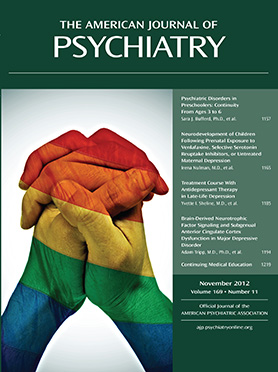Neurodevelopment of Children Following Prenatal Exposure to Venlafaxine, Selective Serotonin Reuptake Inhibitors, or Untreated Maternal Depression
Abstract
Objective
Effects on child neurodevelopment of neurotransmitter reuptake inhibitors used as antidepressants during pregnancy have not been adequately studied. The authors compared the effects of prenatal exposure to venlafaxine (serotonin-norepinephrine reuptake inhibitor), selective serotonin reuptake inhibitors (SSRIs), and maternal depression.
Method
A cohort derived from a prospectively collected database included four groups of children born to 1) depressed women who took venlafaxine during pregnancy (N=62), 2) depressed women who took SSRIs during pregnancy (N=62), 3) depressed women who were untreated during pregnancy (N=54), and 4) nondepressed, healthy women (N=62). The children’s intelligence and behavior outcomes were evaluated with standardized instruments at one time point between the ages of 3 years and 6 years, 11 months.
Results
The children exposed to venlafaxine, SSRIs, and maternal depression during pregnancy had similar full-scale IQs (105, 105, and 108, respectively). The IQs of the venlafaxine and SSRI groups were significantly lower than that of the children of nondepressed mothers (112). The three groups exposed to maternal depression had consistently, but nonsignificantly, higher rates of most problematic behaviors than the children of nondepressed mothers. Severity of maternal depression in pregnancy and at testing predicted child behavior. Maternal IQ and child sex predicted child IQ. Antidepressant dose and duration during pregnancy did not predict any cognitive or behavioral outcome.
Conclusions
Factors other than antidepressant exposure during pregnancy strongly predict children’s intellect and behavior. Depression during pregnancy is a significant risk factor for postpartum depression. Children of depressed mothers may be at risk of future psychopathology.



